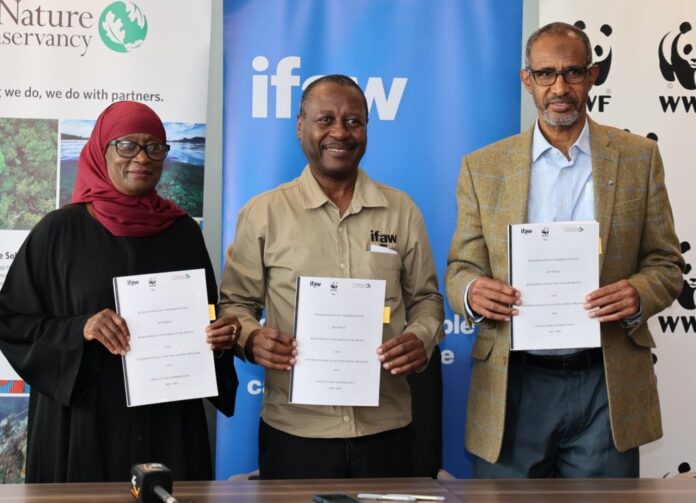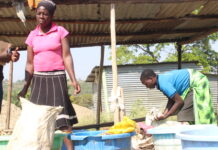
By Liz Anyango
Nairobi, Kenya – Three leading conservation organizations, the International Fund for Animal Welfare (IFAW), The Nature Conservancy (TNC), and the World Wide Fund for Nature (WWF-Kenya ) have joined forces in a bold five-year partnership to collectively address some of Kenya’s most pressing environmental and social challenges.
With rising human populations, shrinking wildlife habitats, and the escalating effects of climate change, this agreement marks a significant milestone in Kenya’s conservation efforts, highlighting the urgent need for innovative and united action for the benefit of nature and people.
Recognizing this, the three organizations are not only committed to addressing these environmental challenges but also ensuring that local communities who live alongside wildlife in their lands are at the heart of the conversations for change and benefit from living wildlife.

In Amboseli, a world-famous National park in Southern Kenya, for instance, where elephants and pastoralists often clash over limited water resources, the stakes are high. These conflicts not only endanger lives but also undermine conservation efforts.
“Our landscapes and wildlife are under immense pressure,” said James Isiche, IFAW’s Africa Director. “By working together, we can bring stronger, more effective solutions to the people and wildlife who need them most.”
WWF-Kenya’s CEO, Mohammed Awer, reiterated that the partnership is not just about collaboration it is a crucial turning point in how conservation is approached.
“Here in Kenya, we recognize that our national development is linked to the health of our environment. We cannot ignore this truth, because if our ecosystems collapse, so will our economy and our society. This is a symbiotic relationship that demands harmony, and a sustainable alignment of People, Planet, and Profit. Achieving this requires more than just ambition; it demands transformative partnerships and climate action investment for greater impact.”
At the heart of the partnership is a commitment to a human rights-based approach to conservation, ensuring local communities are not only involved but also have a say in decisions that affect their land and resources.
Munira Anyonge Bashir, TNC Kenya’s Government Relations and Policy Director, stressed that empowering communities at the local level is key to the success of the partnership.
“When people are included in the process and see how conservation benefits them, they take responsibility for protecting their environment,” she said. “This is about more than nature, it is about improving livelihoods, building dignity, and empowering people.”
She added that the partnership will also focus on practical solutions for everyday challenges. For instance, families who depend on firewood for cooking will have an opportunity to explore and adopt affordable, sustainable alternatives.
This will help reduce deforestation while ensuring communities have the resources they need for their daily lives.
By focusing on empowering communities, the partnership seeks to foster a more inclusive, sustainable future for people and nature alike. The partnership will also focus on preventing, responding to and mitigating the pressing issue of human-wildlife conflict in Kenya.
One of the key solutions is the opening up of livestock and wildlife corridors designated paths that allow wild animals and pastoral communities and their livestock to move freely between habitats. These corridors will help reduce clashes between wildlife and local communities.
Climate financing was another critical issue highlighted during the signing of the tripartite agreement. The leaders from the three pooling resources for conservation will ensure a long-term sustainable investment for climate action.
In Amboseli, joint funding is already being used to protect critical landscapes. “Sustainable financing is key to ensuring our efforts continue for generations to come,” said Isiche.
As the world watches Kenya’s community centric conservation story unfold, through the groundbreaking partnership , climate change and biodiversity loss threaten communities and wildlife alike, the combined expertise of IFAW, TNC, and WWF-Kenya offers hope. With over 50 years of collective experience, the three organizations plan to deliver projects that protect nature while ensuring that communities thrive.
“This is about more than protecting wildlife,” added Isiche. “It’s about creating a future where people and nature coexist in harmony. Together, we are stronger and we’re ready to make a real difference.”













